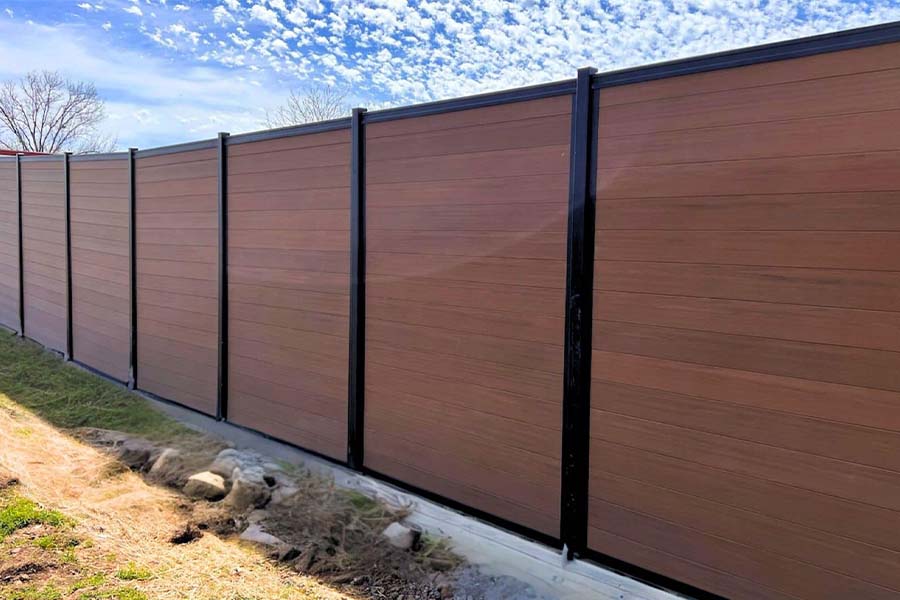All Categories
Featured

Selecting the appropriate fence product is vital for achieving the balance of longevity, aesthetic appeals, and performance that matches your home. Wood, plastic, and light weight aluminum are prominent selections, each with unique functions that provide to particular requirements. Below's an extensive appearance at the benefits and negative aspects of these three products.
Wood Fencing. Pros:. Classic Appeal: Timber supplies an all-natural, classic appearance that matches different architectural styles. Customizable: It can be repainted or tarnished in a selection of shades and styles. Cost effective: Timber fences are frequently more affordable in advance than plastic or aluminum. Eco-Friendly: As a renewable resource, timber is naturally degradable and lasting when sourced responsibly. Cons:. Maintenance-Intensive: Requires normal discoloration, paint, or sealing to shield versus weather condition and bugs. Shorter Life Expectancy: Depending on the type of wood and climate, it commonly lasts 10-15 years. Susceptability to Damages: Prone to decomposing, warping, and termite damages without proper treatment. Timber is optimal for home owners who value aesthetic appeals and want to invest effort and time in maintenance to prolong its life.
Plastic Fencing. Pros:. Durable: Resistant to pests, rot, and weather condition, vinyl preserves its structure in rough conditions. Reduced Upkeep: Calls for little upkeep past occasional cleaning. Lengthy Life expectancy: Plastic can last 20-30 years without considerable wear or damages. Versatile Designs: Readily available in different colors, structures, and styles, consisting of choices that simulate wood. Disadvantages:. Expensive Installation: Vinyl fencings are much more expensive to set up compared to timber. Fragile in Cold Weather: Plastic can split in severe cold climates. Challenging to Repair: If damaged, whole sections might need substitute, which can be challenging to match. Vinyl fencing is a wonderful selection for those focusing on longevity and very little upkeep, also if it includes a higher upfront cost.

Aluminum Fence. Pros:. Rust-Resistant: Light weight aluminum does not rust, making it suitable for wet or moist areas. Light-weight but Solid: Deals toughness without being extremely hefty, which simplifies setup. Low Maintenance: Requires bit greater than cleaning and periodic repainting. Long life: Aluminum fences can last for decades without substantial deterioration. Stylish Designs: Typically made use of for attractive objectives, aluminum adds refinement to any type of property. Disadvantages:. High First Expense: Light weight aluminum fencings are amongst the much more expensive choices. Limited Privacy: Typically made with open spaces, they don't obstruct views or sound. Susceptible to Dents: While strong, aluminum can be dented or bent with heavy effect. Aluminum is best matched for those who want a long-lasting, trendy fence and don't need total personal privacy.
Making the Right Choice. Each material has its toughness and weak points:

Timber is ideal for eco-conscious buyers and standard aesthetics who don't mind upkeep. Vinyl benefits house owners seeking a weather-resistant, low-maintenance remedy. Aluminum is a sturdy, decorative option for those that want elegance and durability. Consider your priorities-- whether it's price, personal privacy, upkeep, or appearance-- and consult a fencing professional to choose the material that finest meets your needs. A well-selected fence will enhance your residential property for several years to find.
Latest Posts
Decorative Iron Fence: Strength Meets Style at Montana Fence
Published May 03, 25
1 min read
Discover Costs Secure Fencing Solutions with Montana Fence
Published May 03, 25
1 min read
A Smooth Bathroom Remodel Experience
Published May 03, 25
1 min read